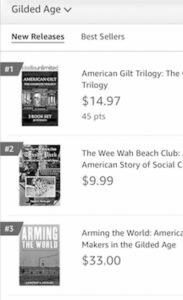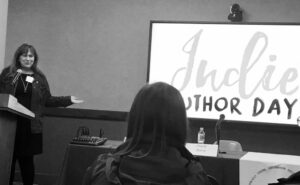Historically labeled as vanity books, the preconception toward the self-published author is one of an arrogant, usually wealthy writer, typically promoting the virtues of their life and (mis)adventures through an autobiography. Their wealth enabled the printing of their story, as a print house usually required a first run of at least 1,000 copies be manufactured.
 But today, in 2024 with the advent of new technology such as print-on-demand, an entire array of self-published authors has advanced upon the literary world delivering a broad assortment of novels on a wide variety of topics, from historical tomes and romance novels to how-to books and self-help guides. As Amazon has discovered, they are a financial gold mine.
But today, in 2024 with the advent of new technology such as print-on-demand, an entire array of self-published authors has advanced upon the literary world delivering a broad assortment of novels on a wide variety of topics, from historical tomes and romance novels to how-to books and self-help guides. As Amazon has discovered, they are a financial gold mine.
The arduous task of securing a book deal is as challenging for a writer as it is for a musician looking to secure a recording contract. And similarly, the creative muse searching for an outlet in 21st century musicians have pushed them to producing, recording, and promoting their own music, often to a successful end ( i.e.: The Eurythmics ) gaining exposure to an audience and a large fan base that would have otherwise been passed over by a major record company.
First time authors find it equally challenging to gain attention from large publishing houses. Newbie authors are often dismissed and even shunned by traditional publishers and literary agents as well. Expected to write submission after submission to particular and specific guidelines, the rejection letters come in the form of emails – often mere minutes after submitting their work. Like their creative musician counterparts, frustrated writers reach for the option of independent publishing.
The dedication and belief in the value of their story pushes the independent author to not only put in countless hours toward writing and editing their book, but to also assume the costs of research, formatting and producing their book. Taking on the role of publisher, the independent author is also faced with the promotional and marketing expenses of their writing project.
In addition, the indie writer is faced with the preconceived notion that he completes the project without the assistance of others. Nothing could be further from the truth, as often an interested group can be assembled of talented and experience assistants, either as volunteers or as subcontractors, to contribute their skill with the jobs of editing, formatting, graphic design, social media, and other tasks necessary to produce and market their books.
Assuming the job of financer for their projects, today the independent author has a variety of new outlets to make their books available to the public, namely through the internet. In 2024 a diversity of formats can be offered to ‘readers’ such as an e-book and audio book, often with the option of enjoying the story right on their cellphone. Still a choice for those who enjoy the touch of a traditional print book, with the advent of computers and print-on-demand, gone are the days of large-scale printing cost for a hardback or paperback book.
The Indie writer is faced with the preconceived notion that he is a second-rate author, due to the fact that he does not have the backing of a publishing house. Many Indie writers have started their own publishing company to avoid these prejudices. Create a business name, a logo, a website and voila, they are a publisher.
But does the backing of a traditional publisher guarantee a good book? How many sagas or diet books have been offered by major publishers only to fail to find an audience and end up in the bargain book bin, while other outstanding books were dismissed and ignored because they failed to get the attention of an agent or publisher? The backing of a traditional publisher is not a guarantee to the reader for a ‘good book’.
 The label of ‘vanity publishing’ and the preconceptions and prejudices toward the self-published author must be re-evaluated in the 21st century. It is time to validate the self-published author as not that of a bored, wealthy writer, promoting the virtues of their life or adventures, but as a writer with an interesting character to explore or a fascinating story to tell – passed over by an over-worked publishing industry inundated by a mountain of books. They simply cannot deal with the quantity of material offered.
The label of ‘vanity publishing’ and the preconceptions and prejudices toward the self-published author must be re-evaluated in the 21st century. It is time to validate the self-published author as not that of a bored, wealthy writer, promoting the virtues of their life or adventures, but as a writer with an interesting character to explore or a fascinating story to tell – passed over by an over-worked publishing industry inundated by a mountain of books. They simply cannot deal with the quantity of material offered.
In the end, the value of a book lies not in the publishing houses, but in the reader. Even books considered pulp fiction, often disregarded by prominent writers, sell huge quantities. Why? Because these books fulfill a hunger for fantasy or adventure in the reader that must never be disregarded. The reader, as the buyer, casts the ultimate vote on the significance of a book.
I had a story to tell. And an urgency to tell this story that pushed me to spend years researching and writing the AMERICAN GILT TRILOGY. Exasperated with the challenge of securing an agent or publisher I assumed the arduous difficulties of publishing myself and the tremendous expense that the job presented without any guarantee of recouping my investment.
Now with over 9 Million pages – or 30,000 books, read on Kindle alone, I find validation not by the backing of a publishing house, but by the readers and the continuing popularity of this true tale based on the life of a débutante shunned by society in 1880’s New York society.
In the end, it is the fans – the readers, that declare the definitive decision as to the merit of a book.